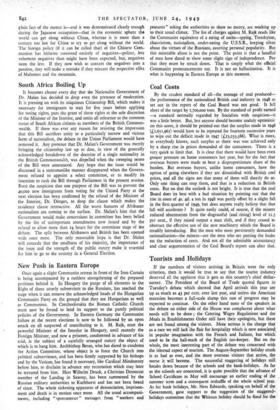Coal Costs
By the crudest standard of all—the tonnage of coal produced— the performance of the nationalised British coal industry in 1948 as set out in -the report of the Coal Board was not good. It fell short of the target by 1,7oo,000 tons. By the standard of profit earned —a standard normally regarded by Socialists with suspicion—it was a little better. But, lest anyone should become unduly optimistic on this score, it should be pointed out that the surplus made in 1948 (£1,651,965) would have to be repeated for fourteen successive years to wipe out the defiicit made in 1947 (£23,255,586). What is more, as everybody knows, such surplus as there was was achieved only by a sharp rise in prices demanded of the consumers. There is a very quick to limit that. It is clear that there would have been even greater pressure on home consumers last year, but for the fact that overseas buyers were made to bear a disproportionate share of the burden. But overseas buyers, unlike home consumers, have the option of going elsewhere if they are dissatisfied with British coal prices, and all the signs are that many of them will shortly do so. Only one thing can stop them, and that is a reduction in British costs. But on that the outlook is not bright. It is true that the coal Board does its best with a bad situation by pointing out that the rise in costs of 4s. 4d. a ton in 1948 was partly offset by a slight fall in the first quarter of 1949, but does anyone really believe that that fall will accelerate ? It quite easily could, of course, if the miners reduced absenteeism from the disgraceful (and rising) level of 11.5 per cent., if they raised output a man shift, and if they ceased to obstruct the effective use of the new machinery which the Board is steadily introducing. But the men who most persistently demanded nationalisation—the miners—are the men who are putting the brake fon the reduction of costs. And not all the admirable accountancy and clear argumentation of the Coal Board's report can alter that.


































 Previous page
Previous page